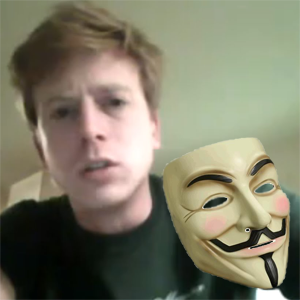 NEWS
NEWS
 NEWS
NEWS
 NEWS
NEWS
![]() In what would make the second time this year, Barrett Brown was raided by the FBI. This time the event happened “on camera” and a portion of it was recorded during a live video chat where he was holding a discussion with others.
In what would make the second time this year, Barrett Brown was raided by the FBI. This time the event happened “on camera” and a portion of it was recorded during a live video chat where he was holding a discussion with others.
Wired magazine has an article (and recorded video) up right now about the incident that shows about 2 minutes into the recording, the video is cut off, and loud voices are heard commanding:
Two minutes into the recorded chat session, loud voices could be heard in the background of Brown’s residence in Texas while the woman in the room with him was in front of the computer screen. She quickly closed the computer screen, but the audio continued to capture events in the room as the FBI appeared to strong-arm Brown to put handcuffs on him. Brown could be heard yelling in the background.
The raid shows an interesting reaction of the chat participants who seemed to be idly gaggling and giggling along with the video participants and suddenly switch to laughter and confusion. It takes them a while to start guessing that an actual FBI raid was occurring on the other side of the black screen.
A spokesperson for the Dallas County sheriff’s office confirmed that Brown was raided on Wednesday, booked into county jail around 11 p.m. and then removed by the FBI to a different facility.
While Brown has been coined as a “spokesman” for Anonymous, he is largely not thought as one by much of the cells that make up the leaderless collective. He has been moving in their circles for some time and claims an affiliation with Encyclopedia Dramatica—a parody of Wikipedia that puts up articles that are defamatory and vulgar, often designed for shock value about individuals and items. ED is a mainstay of the Anonymous culture for its tentative connection to 4chan and other origin points for much of the Anonymous cultural phenomena.
This latest raid appears to be connected to a video he put on YouTube commenting on a particular FBI agent named Robert Smith who is involved in potentially threating Brown’s mother with obstruction of justice charges. In the video he goes on about how he is going to dig up dirt on Smith’s adult children in order to embarrass him.
In the video Brown also mentioned that he was armed and would defend himself if the FBI chose to raid him again—perhaps exacerbating the style of raid perpetrated against him. In the audio of the raid the agents entering are heard using profanity and other less-than-professional language to subdue Brown and the woman in the room.
“It’s hard to understand the context [of what he said],” California attorney Jay Leiderman, a member of Brown’s legal team said. “But this is speech, so ordinarily we go to a First Amendment defense, but obviously there are lines that can be crossed where you can lose your First Amendment protection.”
Sometimes you will be recorded and everyone will know
Recording equipment, Internet capability, and streaming has become an almost ubiquitous technology.
We’ve seen livestreaming used to broadcast citizen journalism during protests that displayed police action (including brutality) and sometimes violence during riots in places like Europe. As a result, police activity and protester behavior is coming under even more scrutiny than before as police themselves rarely record their actions.
One might say the revolution will not be televisied; but it might be livestreamed at this point.
The expansion of this sort of technology gives a level of intimacy with events that happen outside of the view of everyday people and provides a different angle. One that enables citizens themselves to document actions that they themselves are part of–be it a police raid, a raging hurricane tempest, or even an astronomical event. It means that news and documentary evidence can be gathered at the point of the event by those involved and then put somewhere like YouTube where it becomes part of the public consiousness.
The FBI raid of Barrett Brown may or may not have been legitimate; but the fact that it has been recorded and struck a chord with an Internet community means that many of those involved would know immediately afterwards (and now we also know).
In a way, this sort of capability means that nobody with a camera and an Internet connection is very far away from anyone else with an Internet connection.
Support our mission to keep content open and free by engaging with theCUBE community. Join theCUBE’s Alumni Trust Network, where technology leaders connect, share intelligence and create opportunities.
Founded by tech visionaries John Furrier and Dave Vellante, SiliconANGLE Media has built a dynamic ecosystem of industry-leading digital media brands that reach 15+ million elite tech professionals. Our new proprietary theCUBE AI Video Cloud is breaking ground in audience interaction, leveraging theCUBEai.com neural network to help technology companies make data-driven decisions and stay at the forefront of industry conversations.